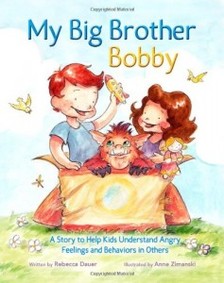 Being angry, seeing red, meltdowns, and freaking out are just a few words we have to describe what happens when a person loses control of themselves. My Big Brother Bobby: Understand Angry Feelings and Behaviors of Others by Rebecca Dauer helps siblings, classmates, friends and other family members to understand children who struggle with emotional and behavioral problems. For some of our children their lives or their environment become overwhelming. They just can’t deal with all the sensory bombardments and may act out, withdraw, become emotional, run, etc. My Big Brother Bobby is a fun, imaginative story that educates children on the importance of understanding and coping with anger in others in a warm and easy to understand way. It isn’t your typical children’s book. It is more of a communication bridge between parents, social workers, OTs, psychologists and children who are dealing with emotional issues, specifically those living with siblings with angry outbursts. Rebecca’s blog is a wealth of information about siblings of children with special needs. We thank Rebecca Dauer for her guest post introducing her book and agreeing to take part in our Author Interview Series. Lorna: Congratulations of your book, My Big Brother Bobby: Understand Angry Feelings and Behaviors of Others. What is the story behind this book? Why did you think a book on this topic was needed? <<Rebecca Dauer: The story behind the book is loosely based on stories from friends and family as well as my personal experiences. When I was younger, there was very little materials or outlets for siblings and I felt the need to change it. After doing research for the book, I found an immense amount of support from the sibling community. Everyone can relate to this book, whether it is a parent, sibling, cousin or friend who has a monster in their belly, it is hard on everyone and especially for young children. I wanted to bring to light the real struggles and emotions that children have and to bridge the communication gap for parents and health professionals.>> Lorna: You and the illustrator, Annie Zimanski, make a very good team. Annie’s illustrations bring your story to life! Usually how does the author of a picture book work with the illustrator? It seems to me there is a lot of communication that most go on to finish with a beautiful book like My Big Brother Bobby. <<Rebecca Dauer: Great question! I found Annie on elance.com after searching through several children’s book illustrators. I loved her work and she related well to the book. The first step in the process is to understand the story and then, creating the characters in the right medium. For example, they could look digital, acrylic or have a soft pastel look. Each change of color, character and background give a different look and feel to the book. Once the characters are built, then you break down each illustration by page with a sketch. Once each page is sketched and tweaks have been made, full color and background detail is added. Then there are a few final edits and that’s it! I enjoyed working with Annie and would recommend her to anyone looking for a great illustrator.>> Lorna: Is this your first book? You chose to self-publish it. What advice do you have for other authors who are thinking of self-publishing their book? <<Rebecca Dauer: Yes this is my first book. Self-publishing is a bit more streamlined and inexpensive because you don’t need an agent or wait until you are signed. If you have a PDF version of your book, you simple buy an ISBN and upload online. I used CreateSpace through amazon where books are purchased on demand. I was also able to add the book to the app store. I also became a member of the Independent Book Publishing Association (IBPA) for its resources and helpful guides into the publishing world. I recommend using those, becoming a member of IBPA, creating a website and promoting through social media.>> Lorna: In your book you mention a support organization for siblings, Sibling Leandership Network and the Sibling Support Project. Please tell us what they offer siblings. <<Rebecca Dauer: The SLN and the Sibling Support Project are completely dedicated to helping the siblings of children who are physically or mentally disabled. The SLN provides siblings of individuals with disabilities the information, support and tools to advocate for their brother or sister to promote the issues important to them and their entire family. They are also very involved in policy and advocacy. The Sibling Support Project headed by Don Meyer (who wrote a review for my book) is a national effort dedicated to the life-long concerns of brother and sisters of people who have special health, developmental, or mental health concerns. Sibshops are International and give children a community-based peer support program and provide awareness of siblings unique, lifelong, and ever changing concerns through workshops, websites, and written material. It is an amazing community and organization. If you would like more information, please visit below: -To keep reading the article please click: HERE
0 Comments
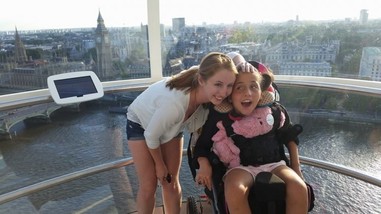 To my fellow siblings of children with special needs: I’m going to give you some unsolicited advice. But first, let me start by saying I’m the proud older sister of a beautiful 12-year-old girl with a severe physical disability. Though I’m nearly eight years her senior, my sister, Lexi, is my best friend. Since her birth, my family’s path has been a little bumpy, but I feel blessed to have Lexi in my life every day. I don’t think for a minute that my experiences with Lexi give me any license to comment on your life or your feelings. I’ve spent many years trying to explain to parents that even they cannot truly understand what it’s like to be the sibling of their child with special needs. The relationship between a parent and a child is so different from the one between two siblings. I’d be entirely hypocritical to suggest it’s not difficult to be the parent; I’m awestruck by the strength of my mom and dad every day. But my parents cannot understand what it’s like to be Lexi’s sister any more than I can understand what it’s like to be her mom or dad. In the same fashion, I cannot understand what it’s like to be your sibling’s sister any more than you can understand what it’s like to be Lexi’s. But I do like to think my past 12 years of both angst and joy with my sister have left me with some insight into living in the world of disabilities. So I’m going to share with you a few things I think are important for every sibling of a child with special needs to know. Your life will be hard. You know this, obviously, but I still think it’s a critical to acknowledge this. Countless doctors, physical therapists, family friends, and, occasionally, even strangers in the middle of the grocery store have told me the hard times are nothing compared to the knowledge and inspiration I will gain just from being Lexi’s sister. I love Lexi more than anything in the world, but being her sister straight up sucks sometimes. It’s more than feeling a pang of jealousy or worry in my heart, and it’s more than the frustration that comes with constantly preoccupied parents. For me, it’s the devastating injustice of having my college fund drained to pay off medical bills. It’s the crippling guilt that comes with watching my mom struggle to take care of my sister when I leave for school. It’s an undying commitment to take care of a child who isn’t mine to take care of. I don’t want you to get the wrong idea because I wholeheartedly believe it’s all worth it. I wouldn’t trade Lexi for anything or anyone. But I also think it’s so important for you to know that it’s OK to feel like disabilities suck sometimes. It’s OK to be jealous and resentful and guilty. It’s OK to be tired of hearing about healthcare and insurance, and it’s OK to wish your life was easier. I certainly feel that way sometimes. To read more click here: http://themighty.com/2015/01/to-my-fellow-siblings 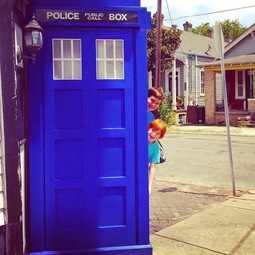 *Editor's note: The following was a conversation I was lucky to be privy to between my two sons, over the course of about twenty minutes. I've omitted several things for privacy, and cleaned up others, while trying to keep the language as close to the original conversation as possible. I received both sons' permissions before publishing this. "Morgan," Bay asked, "what's it like to be you?" The question was asked as the boys finished dinner and I sat away from them, reading a book. I marked my place and quietly listened. "Well," Morgan said, "it's confusing. You know I'm an autism kid. Noises are big. Clothes have to be soft. Smells are hard." He went back to eating, apparently satisfied with his answers. "But, Morgan, what's it like? Why is it confusing to be you?" Morgan took a deep breath, pondered this question some, and then said, haltingly, "People think I don't listen, but I do. Teacher always says, 'Pay attention, sweet boy!' but I am paying attention. It's hard. I pay attention to everything, all at the same time. I can't pay attention to just one thing... I can't always use my words." "There are all of these sounds and thinks (thoughts) and I can't just pick one. Can you?" I sat, stunned. Morgan's never talked to his father or I like this. He's never really been able or rather, we've never been able, to get him to talk to us like this. "Morgan," his brother started, "why do you script? Why do you use Thomas so much and love him so much?" "I just do. The stories are in my head, 'cause I'm a narrator. I love Thomas, he's my friend. He's a very useful, cheeky engine." "But you know, other kids don't like him as much, right? I mean, aren't you worried about bullies? Why do you talk like that (meaning nasally quality/monotone and scripting)?" "I don't care if they don't like him, Mama says he's mine to love. Mama and Daddy say bullies just don't get hugged enough. I told you- I talk like this 'cause Jesus made me this way. Now, stop being a bossy boiler or this conversation is over!" (note the script) Me: "Morgan, is there anything that's really hard for you?" "Yeah, people when they give me too many directions. That's hard." Having my own struggles with this, I agreed with him. "Going new places used to be bad, but sometimes it's fun now. But not too much. Rounding (numbers). Noise. Making people understand me." "Haircuts used to be really hard, right?" "Yep, but they're not so bad now. The hairs still feel like poking on my skin, and I'm scared my ears'll be chopped off." "Mama won't cut your ears off-" "But I feel the scissors coming in! My brain tells me my ears are in danger and I need to yell!" Me: "What would you make people understand?" "I need to chuff (when he makes train noises and moves his arms in a circular motion, bent at the elbows). Ya know, trees stim? I'm a good boy and really useful. Don't talk about me in front of me. Kids shouldn't make fun, the grown ups, either. It's mean. People should understand people." I started tearing up. Bay: "What's easy for you? You're good at lots." "Making breakfast (he makes English muffins with cream cheese every morning for himself). Thomas stories. Tying my shoes. Making train sets. Snuggling. Smiling. Laughing. Swimming. Remembering the way." To read the rest of this amazing article click here: http://www.decipher-morgan.com/2014/10/what-its-like.html 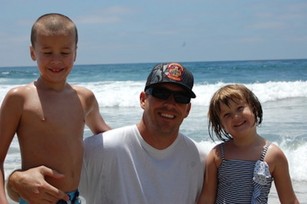 Below is a letter I’ve written to my daughter. She’s the younger of our two kids. But I already see that in some situations, she takes the big sister role. I so badly want her to understand her brother’s autism. I know she notices that he gets more attention than she does… and I don’t think it will stop. Anyways, here it is. Dear Lucy, I’ve been thinking about writing this letter to you for about a year now. In that time, I’ve been noticing you noticing me… and it hasn’t always been positive. For the most part I think I’ve been doing a pretty good job as a parent and daddy. But I know I’m letting you down in a crucial area of your life, and I’m not sure that I can stop. In the last couple of weeks, I’ve made you cry, and it breaks my heart because I know it will not be the last time I do so. I’ve ignored you, favored your brother, and I know it hurts your heart. I just want to let you know — I’m aware of this, and it hurts my heart too. You’re the baby of our family, and as much as I want you to always be Daddy’s baby, I also want you to grow up quickly so you can gain a certain amount of understanding. I guess I want this for you so I don’t feel like I’m damaging you as much. You see, your older brother has autism, and I fear that it takes from you at times. I started a nonprofit organization because of your brother, in hopes that we could help other families. It takes up a ton of my time. When you ask me to play while I’m working, I tell you, “No” way more than I tell you, “Yes.” I see that it breaks your heart. It breaks mine too. The local news did a interview with me, and your brother was in it. You watched it and didn’t understand why you weren’t included. I didn’t have a good answer. I didn’t think you would understand. We shot a brand new “About Us” video, and you asked me, with tears in your eyes, “Why am I not in that video?” Once again, I didn’t have a good answer for you. You left the room, and then the tears hit my eyes. Your brother has behavior therapy twice a week for two and a half hours a session and a socialization class once a week. You don’t understand why you don’t get to do these things. I try to explain it. I clearly don’t do a good job. You’re developing at a rapid pace, and I’m in constant amazement at how easy you learn. It also serves as a constant reminder that your brother doesn’t have it this easy. I need to stop and celebrate you more. You deserve it. You and your brother are playing on the same soccer team for the first time, and you’re holding your own with these older kids. Daddy is so proud of you! But, if I’m being honest, I catch myself watching your brother more than I watch you. And it’s not fair to you. I think it’s because I expect you to keep getting better. When I watch him, I’m hoping he gets better. I’ve tried a couple of times to explain autism to you. I’m pretty sure you don’t fully understand. I’m not sure why I expect you to, when most people 10 times your age don’t get it. Someday you will… I just wish it was today. Please know that Daddy is doing his best and also know that he wants to do better. I love you way more than you know. For original article: http://themighty.com/2014/09/a-letter-to-my-daughter-about-her-brothers-disability/ 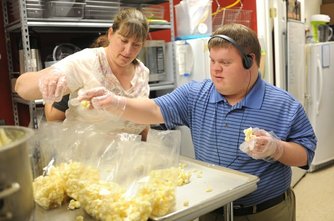 Blake Satterfield is proud to open the door and greet guests at Special Kneads and Treats on the Lawrenceville downtown square. He shows guests to a table and to the gourmet cupcakes on display behind the bakery counter. Blake has Down syndrome and wouldn’t be the first person many businesses would put at their front door. But Blake and others with special needs are the reason why Special Kneads and Treats opened four weeks ago. “From his first day here, he has felt included and productive,” said Blake’s mother, Pat Satterfield. “It’s a wonderful thing for our guys to give back to the community and feel accepted and useful. Once they get the hang of things, when they see a need, they get things done and make people feel welcome.” Special Kneads and Treats at 132 E. Crogan St. is a nonprofit bakery that provides job skills training to special needs adults. It was opened by Tempa Kohler and her husband, Michael, when they purchased the former Sweets on the Square. “We prayed for only provisions and a building and God gave us a bakery with ovens, freezers and an established client base,” Tempa Kohler said. “And now we’re building our own client base. It’s awesome and definitely a God thing.” The Kohlers opened the bakery to help their son Bradley, 24, who was diagnosed with Fragile X Syndrome when he was 7 years old. Fragile X Syndrome is a genetic chromosome disorder that causes mild to severe mental impairment. “Kids with special needs can stay in the Gwinnett School system until they are 22 years old and then they age out,” said Kohler. “We’re here to employ special needs adults and give them a place to come and work and hopefully learn a skill set that they can take to another location.” Kohler is operating the bakery with one employee and five special needs adults who often have family members who stay and help with baking duties. The special needs adults have opened the door and greeted guests, washed dishes, cleaned tables, swept the floor and helped with lettering on cupcake wrappers denoting when they were made. They also help in the kitchen when adequate supervision is in place. Adults with special needs are loyal,” Kohler noted. “They’ll be the first to show up and if you show them a job, they will do it and do it well.” To Read the full article click here: http://www.gwinnettdailypost.com/news/2014/mar/01/lawrenceville-bakery-provides-job-skills-training/ 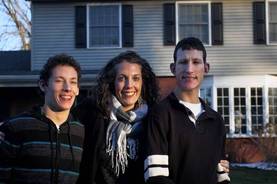 Growing up with a severely disabled brother, Abby Brown felt less like a sister than like a "third parent." Nigel, two years her junior, was born with a rare disease called linear sebaceous nevus syndrome that left him non-verbal and needing assistance to eat, dress and use the toilet. As a child, Brown mourned the normal things she couldn't do, like take family vacations or go to the mall, without her brother having a seizure. As an adult, she nervously anticipates a time when she'll be in charge of his care."Where will he live when my parents are unable to take care of him?" wonders Brown, 21, a student at Nipissing University in North Bay, Ontario. "How will I manage taking care of aging parents, a disabled brother and children of my own? Will I ever find a partner who is willing to take on the responsibility of caring for my sibling with me?" Brown's concerns are emblematic of the complex, lifelong and generally unsung relationships between disabled people and their siblings, who often log more years than anyone supporting their special needs brothers and sisters without getting much support of their own. "I find myself frequently in the ludicrous position of having to remind my friends, my colleagues, people who worship at the altar of family-centered services, that siblings are part of the family," said Don Meyer, director of the Seattle-based Sibling Support Project (siblingsupport.org) and creator of Sibshops, workshops that bring together the siblings of special needs kids for recreational activities and peer support. On his Facebook group Sibnet, an adult sibling support site with 1,300 members, Meyer is struck by how common it is for 40-year-olds to proclaim it's their first time meeting others who grew up with developmentally disabled siblings. "People who work with families of kids with special needs would never let the parents wait 40 years to introduce them to their peers," Meyer said. Lifelong challenge A sibling's need for support begins early, Meyer said, as growing up alongside a disabled child forges complicated feelings, from embarrassment to resentment to many forms of guilt. Some siblings feel pressure to be high achievers to balance the scale. Many yearn for the friendship of a "normal" sibling relationship. The experience has its benefits, too: Siblings of special needs kids tend to develop early maturity and increased patience, diplomacy, tolerance and acceptance of difference, Meyer said. Many pursue helping professions, where they serve as powerful advocates for marginalized populations. As parent caregivers get older, a sibling's role takes on new importance, and underscores the value of nurturing the siblings' relationship. About 75 percent of the 4.6 million developmentally and intellectually disabled people in the U.S. live with their families. "If we affirm and validate their contributions as they grow up, we increase the chances that they will elect to remain lovingly involved in their (disabled siblings') lives," Meyer said. To read more click here: http://articles.chicagotribune.com/2013-03-28/features/sc-fam-0326-disabled-sibling-20130326_1_disabled-siblings-sibling-support-project-don-meyer |
AuthorRebecca is an independent publisher working to help siblings of children with emotional challenges. Archives
April 2017
Categories
All
|
My Big Brother Bobby: A Story to Help Kids Understand Angry Feelings and Behaviors in Others
 RSS Feed
RSS Feed
